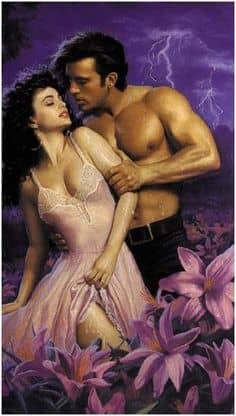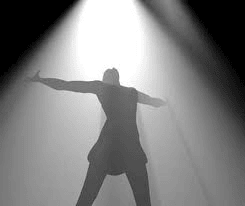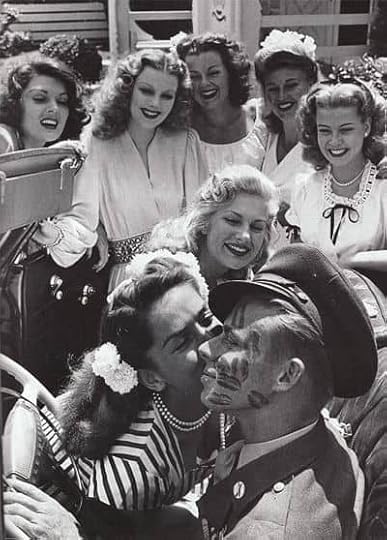The Line Between Order and Chaos: Literature’s Lost Archetypes
My daughter is a huge true crime fan. It’s become our thing, listening to true crime podcasts together. This week, we were listening to a bunch of them as we were driving the interminable journey from Tampa, Florida, where we were visiting my aunt and cousins, back to Virginia. As we were taking in the psycho bitches, murdering husbands, perverted pastors, and doomed goth-maidens (one was skinned alive for the love of God), it occurred to me – and not for the first time, I might add – how tentative the line between a functioning life and all out bedlam can be. How important it is for us to have a dose of clarity – moral and archetypal – along with our nuance and radical tolerance.
The true crime thing also got me thinking about a David Brooks essay in the New York Times recently. My Speakeasy partner, Janet, sent it to me with the disclaimer, “What I thought was going to be a pretentious article, turned out to be pretty damn good…very Speakeasy.”
Brooks’ piece was about the state of literature and reading in the USA. How novels have become overly determined, politically rigid, and ultimately, not very fresh or relevant. He explores the popular culture drift to genre fiction, often explained by condescending theories about how American readers no longer like to read complex material. Our attention spans have suffered, they claim, and our tastes have become pedestrian at best.
Only the data doesn’t support that. According to reading trends, classical literature is experiencing a Renaissance. It’s only contemporary literature that’s losing out to the massive commercial appeal of genre fiction.
Brooks contends that literary novels began to sink when they went from gestating in Greenwich Village to incubating in the MFA programs. In higher education, conformity trumps hipster independence by a long shot. I’ll be honest, being a Midwesterner with a mere bachelors degree, I’m not clear on the nitty-gritty of what the differences are between Greenwich and the MFA program, but I can definitely see the degradation Brooks is writing about. I’ve long been bored by what The New York Review of Books has been telling me I absolutely must be reading. It’s not that the writing is bad, but that the themes are all too predictable and have lost the ability to upend my expectations.
In my own observations, I think people drifted towards genre fiction not because they became dumber, but because it became the only place they could indulge in views and character types that have been deemed unsavory, archaic or downright verboten. A place where a smart heroine might want a man with a strong personality, and a single mother might not always be a saint.
This is most glaring in the Romance genre. There, you see the unrepentant Alpha male, the virgin, the femme fatale, the vengeful ex-girlfriend. You also see the coward, the radically redeemed man, the classical hero, a celebration of the feminine, a veneration of the masculine. These are all ancient character types that have been largely expunged from literature with a capital L in recent decades. Yet as a culture, we have a need to explore and contextualize them.

John Steinbeck was a master at presenting these archetypes in a nuanced universe that didn’t always line up with our hopes for humanity. So was Raymond Chandler, Milan Kundera, Gabriel Garcia Marquez, Philip Roth, Flannery O’Connor and a laundry list of spectacular authors who used to have the blessing of the literati, but couldn’t have gotten published in recent years. Political types will blame it on DEI, but I don’t buy it. If it were strictly about race, gender, sexual preference, then we’d see politically eclectic black/female/queer authors being celebrated for their artistry. The pro-life trans activist, the black capitalist, the feminist gun-enthusiast, the devout Christian of any stripe.
But we don’t.
Instead, we get a literary landscape that feels sanitized, scrubbed clean of moral complexity in favor of moral certainty. The contemporary literary establishment has become so afraid of offending anyone that they’ve forgotten the essential truth that great literature has always been about wrestling with uncomfortable realities, not avoiding them.
The result is that readers hungry for psychological authenticity have fled to genre fiction. There, in the supposedly “lowbrow” realms of mystery, romance, science fiction, and horror, they find what literary fiction has abandoned: characters who act from genuine human motivations rather than political imperatives. A thriller can present a corrupt cop without contextualizing his corruption through systemic oppression. A romance can explore masculine strength without deconstructing the patriarchy on every page. A horror novel can present evil as a choice rather than a symptom of societal failure.
This isn’t to say social context doesn’t matter – of course it does. But when every character becomes a vessel for political messaging, literature loses its ability to challenge us, to reveal unexpected truths about human nature. We end up with novels that feel more like position papers than works of art.
The irony is that this rigid approach is actually less progressive than the freewheeling experimentation that characterized the best of twentieth-century fiction. Authors like Toni Morrison, James Baldwin, and Alice Walker managed to address issues of race, gender, and power while still creating characters who felt fully human, who unsettled readers with their complexity and contradictions.
What we’ve lost is the understanding that literature’s job isn’t to make us comfortable with our existing beliefs, but to make us uncomfortable with our assumptions. Good literature should disturb us, should force us to confront aspects of human nature we’d rather ignore (Hello, “Lolita” by Vladimir Nabokov). When we sanitize literature, we rob it of its power to transform us.

Genre fiction understands something that much of contemporary literary fiction has forgotten: archetypes endure because they reflect fundamental aspects of the human experience—truths that transcend any given historical moment or political mood. The hero’s journey, the wise but weary mentor, the fall of the corrupted innocent—these aren’t outdated clichés. They’re deep patterns in the collective psyche, echoing our fears, desires, and struggles across generations.
When we exile these figures from so-called serious literature, we don’t destroy them. We just drive them underground—into the realms of genre fiction, fantasy, horror, thrillers—spaces long dismissed as “lesser.” But these are the very stories that continue to grapple, boldly and without irony, with what it means to be human.
Great art demands both moral courage and creative freedom. Writers must be willing to explore uncomfortable truths about human nature, even when those truths defy current orthodoxies. They need the freedom to write characters who are flawed, contradictory, sometimes even monstrous—and to trust readers to find meaning in that complexity.
Perhaps that’s why my daughter and I keep returning to true crime podcasts during our long drives. In those raw, unfiltered narratives, we encounter the kind of moral ambiguity that’s been largely scrubbed from contemporary fiction. We meet killers who are also loving parents, victims who’ve made tragic choices, investigators who bend the rules in pursuit of justice. We hear stories where the line between order and chaos is terrifyingly thin, where the ordinary and the monstrous wear the same face.
These stories remind us that human nature is more tangled—and more fascinating—than ideology allows. They suggest that good and evil aren’t fixed points, but sliding scales. And they force us to confront the possibility that moral clarity is often just the comfort of not looking too closely.
So as my daughter and I wind our way home through the dark, the car filled with voices recounting tales of violence, grief, and resilience, I find myself thinking: maybe the deepest truths don’t come from the literature we’re taught to revere, but from the stories we tell ourselves when no one is watching. Stories about the monsters we might become. And the heroes we still hope to be.




